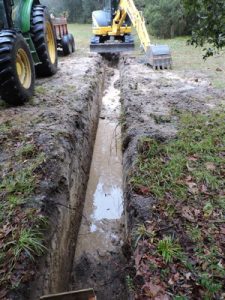22 Feb February 2022: What is Dewatering?


Office: 843 846 2500
www.WillisSinclair.com
Info@WillisSinclair.com
February 2022
Number 96

Palm Coast Villas, Bungalow 17
Kandy and I spent a week in north Florida in January. We visited the cemeteries where our parents are buried, drove by homes where we used to live and stopped by the church where we were married. It was an enjoyable trip.
One of the highlights was a “motel” we discovered: Palm Coast Villas. It was built in the 1930s of coquina stone (a soft, whitish rock made up of fragments of marine shells and coral) inside and outside. The Villas were a great find. They are 250 miles (3:50 hours) south of Brays Island. Marineland, the world’s very first Oceanarium is about 5 miles north. Daytona Beach is about 40 miles south of Palm Coast. The Villas are a short distance from the beach.
Charles Lindbergh and Ernest Hemmingway stayed at the Villas back in the day. At the time it was built, it was the only place to stay between St. Augustine and Daytona. The rates are very reasonable. Check them out: www.palmcoastvillas.com. (They also have some more modern rooms and suites. The original room have microwaves, AC and electric lights now.)
From the Desk of Mandy

History is an interesting topic for discussion. Conversations on the subject can quickly become political and controversial. It is very strange that talking about the chronological events of a country or the world can be so upsetting to some.
Whether we admit it or not, whether we are proud of it or not, whether we were involved in it or not, history has happened. It is not waiting to be approved, it does not depend on being accepted. History, however history is currently being portrayed, is a fact of life.
We’ve often been told, “Learn from history or repeat it.” This is a very interesting statement, and one that can be applied in many ways. It’s easy to take this maxim and apply it on an impersonal, national scale (“What really caused the collapse of the Roman Empire?”), but it becomes increasingly applicable (and much less comfortable to consider) as we bring it closer to home.
How was your day yesterday? Did you enjoy it? Did you accomplish something that you consider worthwhile? Do you face today with a certain sense of anticipation?
Your answers to these questions about yesterday will help you adjust to your actions for today. If your answers were mostly “yes”, then do again today what you did yesterday. If your answers were mostly “no” or “not really”, then you must change something you are doing in order to change the results you precipitated.
“Learn from history or repeat it.”
It does not take thousands of years to generate history; history is happening around us at every moment. Winston Churchill said, “History will be kind to me, for I intend to write it.” He understood that history is not a dry, dead entity. History can be changed in the present. We are each of us writing our own personal history, and we are actively contributing to the history of our community and our nation. Your contributions combined with mine and the contributions of many others will come together to make up the future history of our country. Will the history we are writing be an example to others of what to do or what not to do?
History is not a random and passive something that happened to us yesterday, history is the result of actions we did or did not take in the past. History is simply a non-stop consequence of our daily choices. We are not just observers, but players.
Dewatering – the solution to wet soil






No Comments